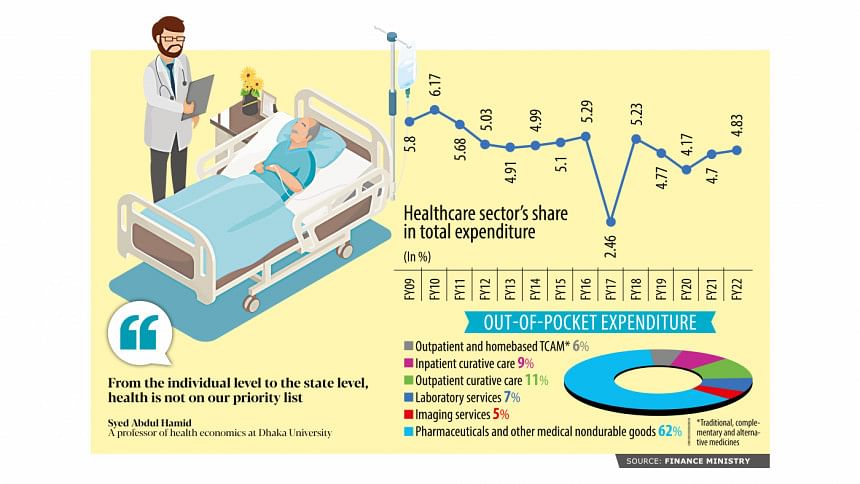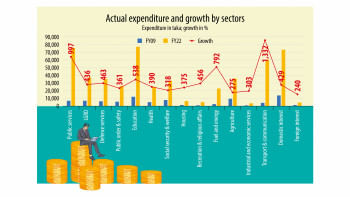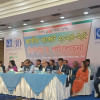Falling healthcare budget forces people to spend more out of pocket

After sweeping to power in 2009, the Awami League-led government in its first year spent around Tk 5,104 crore in the health sector, which was six percent of the total budget for the fiscal year of 2009-10.
Since then, the health sector witnessed considerable development in terms of infrastructure and physicians, among others. However, the government's actual expenditure in the key sector has remained stagnant, and in certain fiscal years, exhibited a decline.
For instance, the outlay for the health sector was Tk 25,028 crore in 2021-22, representing 4.8 percent of the budget of Tk 518,188 crore. It was five percent in the previous fiscal year when the government spent Tk 21,647 crore under a Tk 460,160 crore budget.
Such a dismal spending, one of the lowest in the world, frustrates the health experts who say that the citizens, particularly the poor and those belonging to limited-income brackets, bear higher treatment costs because of the government's poor attention to improving and widening healthcare services.
In fact, Bangladesh has the second highest out-of-pocket expenditure (OOP) on health globally, with 68.5 percent of medical expenses being borne by the people in 2020, the latest for which data from the National Health Accounts, a wing of the Health Economics Unit of the government, was available. War-torn Afghanistan topped the chart at 78 percent.
This out-of-pocket expenditure has been growing at a steady pace. In 2012, it stood at 62 percent. The ratio is way higher than the World Health Organisation's recommended maximum of 20 percent.
The average OOP healthcare expenditure of low- and middle-income countries in 2019 was 35.25 percent, according to a writeup published on East Asia Forum, a platform dedicated to publishing analysis on Asia, in 2022.
The World Health Organization has defined health spending as catastrophic when the share of households' out-of-pocket payments is greater than 40 percent of its capacity to pay for health care.
"From the individual level to the state level, health is not on our priority list. The government also does not give proper attention to it, which increases out-of-pocket expenditure," said Syed Abdul Hamid, a professor of health economics at the University of Dhaka.
He said due to poor attention, people are getting sick, and hospitals become overburdened with patients.
However, since government hospitals can't deal with a huge number of patients, they are compelled to go to private hospitals. Yet, they are not getting the expected services.
The situation has reached a point where people with means receive medical services in countries such as India, Thailand and Malaysia, draining the valuable foreign currencies.
"The net loss is that Bangladesh is becoming an unhealthy nation, and in the name of medical services, a huge amount of money is getting out of the country," said Hamid.
Md Enamul Haque, director-general of the Health Economics Unit, said the unit has found that people spent more on purchasing medicines while the rich spent more than the poor. "This has sent the out-of-pocket expenditure higher."
The WHO recommends that countries like Bangladesh allocate 5 percent of the gross domestic product (GDP) to the health sector. The country's allocation hovers around 1 percent.
The budgetary allocation for the sector has kept rising over the years, but it is because the size of the national budget is increasing. However, the lion's share is mostly spent on providing salaries and perks to officials and meeting other regular expenditures.
What is even worse, a sizeable portion of the healthcare budget fails to reach the beneficiaries due to wrong targeting, erroneous priorities, irregularities, and inefficient implementation, they said.
Budget utilisation is another major challenge for the health ministry as it can't spend the allocated money.
"If we can spend the allocated money efficiently, surely we will get more budget and people's expenditure on healthcare from the own coffer will come down," Enamul said.
According to external experts, out-of-pocket expenditure on health care puts a huge burden on households and reduces their overall welfare. They also found that poorer households were less likely to experience catastrophic out-of-pocket payments since they avoided or delayed required health care.
Low-income households sought medical care from less qualified providers, and, as a result, they faced catastrophic out-of-pocket spending.
Hossain Zillur Rahman, a former caretaker government adviser, said although the budgetary allocation has remained low in the healthcare sector, the lack of capacity to spend the funds has come to the fore.
"Even, people are not getting the services they are supposed to receive from the existing health infrastructures."
He said the out-of-pocket expenditure is high because there is no control over the prices of medicines and tests. "A culture has developed to undertake projects. By contrast, we don't see any performance culture."
Still, the noted economist notes, there is scope to initiate low-cost, bold healthcare initiatives using the funds that remain unspent.
Financial hardship tends to fall negligible levels when out-of-pocket expenditure share of health spending drops to 15-20 percent, according to Sven Neelsen, an economist of the World Bank.


 For all latest news, follow The Daily Star's Google News channel.
For all latest news, follow The Daily Star's Google News channel. 










Comments